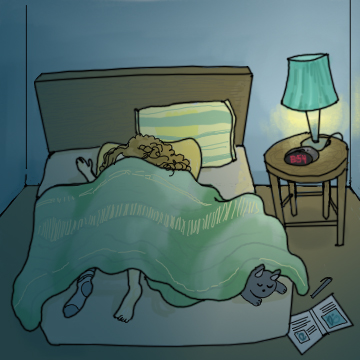Fatigue, memory loss and irritability are symptoms experienced by many college students while they suffer from what the Centers for Disease Control and Prevention have declared a “public health crisis” — sleep deprivation.
“I would be studying before an exam in my apartment at 2 a.m.,” journalism sophomore Mackenzie Dyer said. “I would get to the exam the next day and … I would get to a question on something I knew I was stumbling (on) within the 24 hours previously, and I remember reading it, but I didn’t remember the material because I was depriving myself of sleep.”
Dyer’s experience is not an isolated incident, as the CDC reports one in three adults are sleep deprived. College students experience this for reasons including inconsistent schedules, alcohol, stress, technology, mental illness and the ‘fear of missing out’ in social situations, said Mandy Colbert, health promotion coordinator for University Health Services and the Counseling and Mental Health Center.
“(There’s) the general culture and glorification of being busy, of this phenomenon called ‘competitive non-sleeping,’ where students are almost competing with each other to see who got the least amount of sleep as almost a point of pride or to show they’re working harder or doing better even though that’s probably not the case,” Colbert said.
Chemistry sophomore Bruce Adams and journalism freshman Brynne Herzfeld said their peers have bragged about their lack of sleep as if it were a “badge of honor.” Adams said he also experiences a phenomenon Colbert calls “sleep debt,” where missed hours of sleep collect like credit card debt and wear down the body.
“I would get four or five hours of sleep … during the week, but then I would binge-sleep for 13 hours on Friday and Saturday and catch back up,” Adams said. “It’s like a regular back and forth.”
Herzfeld said her insomnia has flared up since coming to college. She also said she experiences the “Fear of missing out” phenomenon when her Texas Student Television group goes out after meetings, which causes her to lose two hours of sleep.
“I’m a freshman and I conveniently have this group of people that I consistently see every week, so it feels like it’s a great way to make friends and I don’t want to miss out on that,” Herzfeld said.
Colbert said her biggest tip to avoid sleep deprivation and improve health overall is to keep a consistent sleep schedule. Resources from the Office of Health Promotion include a college sleep questionnaire, a sleep habits survey launching in spring that will offer students tailored feedback for better sleep.
“I would love for there to be a sleep revolution on campus where we just talk about how important it is to get sleep,” Dyer said. “I just think because we’re all under so much stress, it’s really easy to go about it in the
wrong way.”














